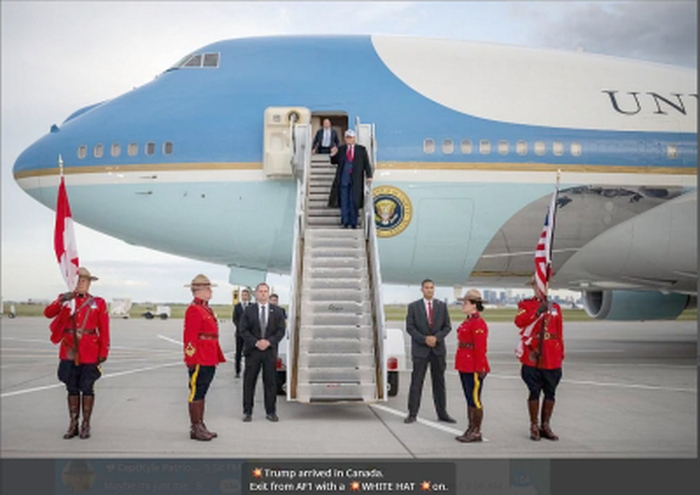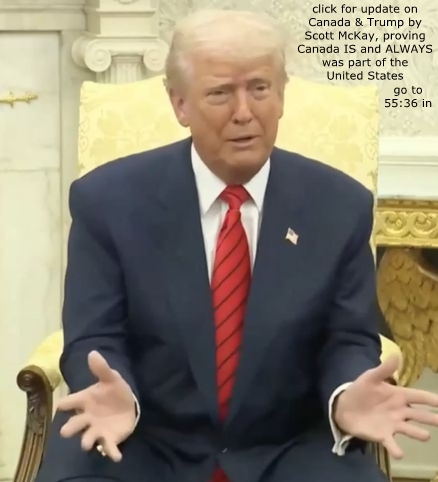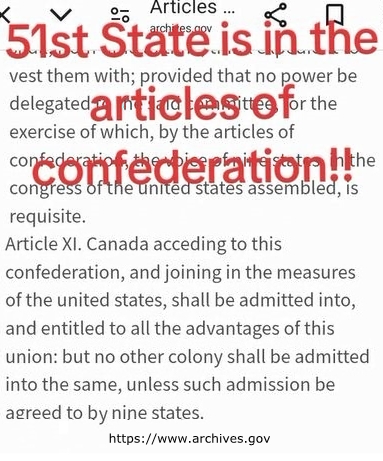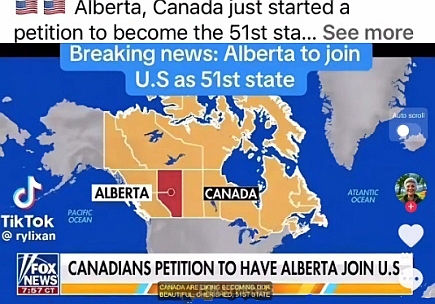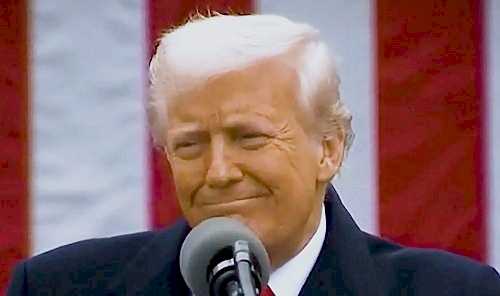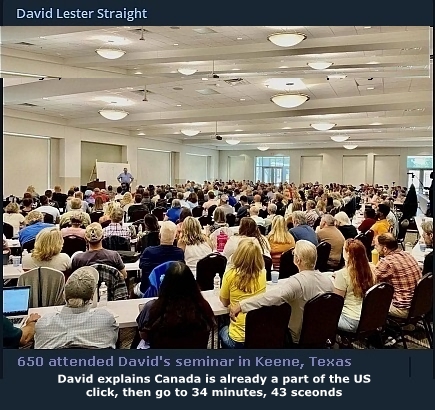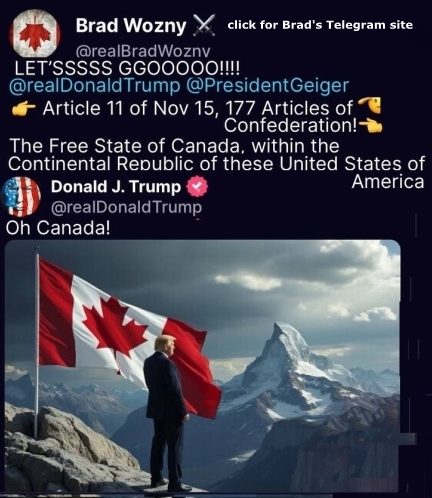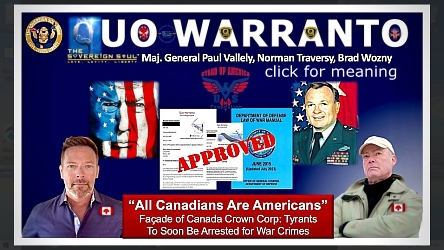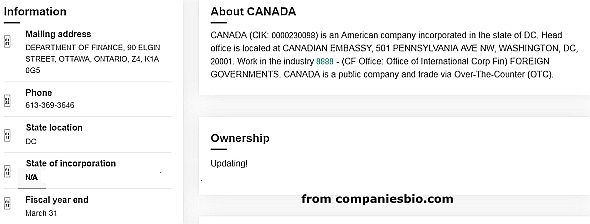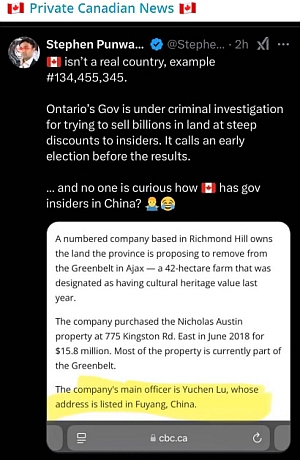Canada's
History: Is July 1st another birthday for Canada? This
one was in 2025, number 158.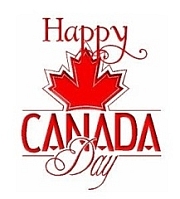
It will be
the last as the corporate cabal controlled government of Canada, which
is actually Canada Inc. a private and now
bankrupt corporation which was owned beyond Canada.(and
you voted for a political party, not knowing who they really were or what
their plans for you were. When will you take time to learn that
there
is God, then you and We
the People can select whom we want to run
things for us in the country?).
The USA
was also a corporation and was also broke because of the satanic financial
Babylonian money system used by those who created & controlled those
corporations for their benefit. See its short history on Situation
Update November 27, 2025 at 51:52 in. And while there see the medical
/ pharmaceutical con at 42:00 minutes in.
While you were
made to pay the price, they 'stomped
you into the dirt'. But that's all over now; be thankful to God, to
Trump, to Putin and the Alliance militaries!
So what was
Canada when it was a foreign corporation? Please see the great video above
Canada
The Illusion.
Canada, like
so many countries in the world today, needs to be and is, changing from
its satanic origins to the new world of
God and becoming again how the country was before the British came to Canada.
Canada and the U.S.A. corporations were set up to con the people out of
both their land and resources. How they did this is in the movie Canada
The Illusion.
Canada finally
awakened to its true origins, that of being one with what is called America
who is now one with other God centered nations, Russia and the
BRICS nations. Remember, there are always two
groups in every country. They are the good and the evil, both in varying
degrees, some being better than others and some worse.
Oh Canada!
The national anthem,
has the words, "...we stand on guard for thee", but easy to see We
the People didn't stand on guard or the
country wouldn't have gotten into the mess it's now having to come out
of. It's a lesson for us all to learn. Be determined toward that. Learn
about and stand up for truth about the country. We don't want evils ever
again to begin to creep in, spoiling the place where we live and the lives
and futures of others including our children. Good people are determined
never again to allow what has happened. They are cleaning up the horrible
mess the evil ones continue to wallow
in.
Canada Inc..(was
an
incorporated geographical expression held by custom. convention and
tradition as a corporate business owned off Canada's shores by foreign
corporate bodies - the extremely evil British Crown & Vatican, the
British Crown now is defunct, the Vatican too and Canada has been bankrupted
by those who used and abused what We
the People thought was our home),
is the foreign held corporation, called since 1867, the government
of Canada and is insolvent
and has been for some time. America, once Trump got it out of bankruptcy,
came to Canada's aid so it could at least keep going until Canada too,
comes out of bankruptcy.
But there were
those in Canada's various political parties, those in all political parties
who never stood up for
We the People
and continued scamming the U.S. for billions yearly to keep Canada going.
The cabal's
plan having been to bankrupt the country and totally subjugate its people
under their so-called new world order, even murdering
Canada's people any way they can.
Did you see
it creeping toward this? Did you know that the satanists
were in control, edging you toward sickness and death and total takeover
of the country? All the while they pretended to be good government, while
they screwed you to the wall.
Canadian
provinces are companies in FOREIGN GOVERNMENTS. But of course the lying
politicians, judicial systems, including attorneys, police, media corporations,
et
al, made sure their efforts involved keeping all this from you, so
their scam would carry on keeping their pockets full and your pockets and
your life emptying.
Canada is really
the U.S. if you research it. Do you research anything or just accept what
others have said, such as what schools have taught about Canada as they
follow the beast of a forced curriculum?
Anyhow, it's
the end of the time allowed for the dark side ones to change from a heart
of evil to one of good. In the time they had left, instead of changing,
they just got worse, putting We the
People on a highway to hell. The new better
life for all good people including those in Canada, is now here thanks
to Trump recognizing Canada as it was before the corrupt
British Crown ruled over Canada as well as the US and that since
the cabal's constitution of 1871, a screwjob on We
the People to put and keep the country
in their hands.
Shall we name
a new day that reflects the joining again of Canadian people with their
brothers and sisters in the US. Nah! Let's just use July 4, American Independence
Day.
No longer called
the US or USA, but now properly 'America', America as evidenced in the
original American 1776 Constitution, now restablished thanks to Trump.
Independence
Day sounds good! Liberation Day too. Homecoming Day sounds good; a coming
back to our original home, before the cabal, which put Canada under Britain
and its corrupted Washington, D.C. controllers hoodwinking
all of us.
Canada has
been a part of America until what become known as the cabal, took over
the United States, supplanting
the good We the People.1776
American Constitution with their own corrupt 1871
one. This took decades of their planning and infiltration. Why did most
people let all the evil just slide in? Because they didn't know their history.
The cabal had already infiltrated the education system. Always be as sure
as you can that you are choosing good:.Psalms
37:9-14.
So, the cabal
got ahold of Canada, right underneath peoples eyes, as they had done in
virtually every other country on Earth, using their tools of lies and deceit,
including propaganda.
Corrupt &
paid off and blackmailed politicians, judges, court systems, police, attorneys,
health systems, etc., etc., etc. who were and are all corporations,
including the media and individuals hidden behind pulling the strings as
the
master controllers, all were in on it for your money, resources and
for control over you for their use toward your death and that because they
are satanic, dark ones who hate males & females God created. Who
were some of the more prominent ones doing these evils?
They were also
content to get you into slavery in all ways, until you would be gone, all
used up. They cared not at all for you and are still that way mostly.
And considering
their ways, those still remaining, yet to be arrested and dealt with, are
still on their pathway of subjugation:.Matthew
7:16-20. They are being taken down so people of love can now live their
hearts in a safe, healthy and prosperous world.
Fraud vitiates
everything. It's then a clear slate to go forward from here. Being happy
that we again are with our brothers and sisters in America and thanks to
Trump and the updated original 1776 constitution, we are brought back into
the lawful country we once were in.
So, because
it was all such a con job from the start, there is no valid historical
truth about Canada that applies today. The fraud just carried on by those
proven to be disreputable.
As an example,
initially, Canada Day
was about the
original four provinces in the Dominion of Canada and would
more correctly be called 'Ontario, Quebec, New Brunswick and Nova Scotia
Day'. Nova Scotia
however,
did
not want any part of it. Maybe they knew what it really celebrated,
British control over them.
Anyhow, Canadian
children were taught about it in the cabal
programmed.(brainwashed).school
system. But, isn't it an accepted fact of Canadian history, that Canada's
birthday is based upon her confederation in the year 1867?
Sorry folks!
There is no historic fact, nor any law, nor any agreement to support the
fairy tale of an actual confederation in Canada in 1867. You've been duped!
We were already with the Americans, but they too, their 13
colonies at the time, were under British control. The schools didn't
teach you and the media kept information of true goings on away from you,
because they were satanists and satanists.always
lie about everything.
Honest constitutional
experts, honest parliamentarians, honest legists and true parliamentary
documentation support information herein.
One may even
think
that Canada's so-called present constitution is an extrapolation
of its confederation, a constitution and confederation all done neat, tidy
and legal. One may think Ottawa is there legally. One may also
think
that Canada's Governor General is legal. And one may think the federal
government in Ottawa has power and control over the Provinces, what with
the so-called constitution that former Prime Minister Trudeau repatriated
in 1982, incorporating documents forming what he called a 'constitution',
documents such as the Magna Carta,
BNA
Act, Canadian Charter of Rights and Freedoms.(that
incorporated his language legislation and an amending formula that made.his.so-called
'constitution'
almost unamendable).including
an Amending Formula. It was a so-called
'constitution' claimed to have been repatriated
by the said Prime Minister, a cabal puppet, like Justin, who came along
later.
How, indeed
can something be repatriated that never originated? It was all part of
Trudeau's con job upon the Canadian people. To restore or return to the
country of birth, citizenship or origin, a constitution must have initially
existed therein and in Canada only the BNA Act (British North America Act)
had been extant and it wasn't a constitution as we comprehend a
constitution to be. What was it then?
One may say,
surely after all this time if something was wrong with the whole setup,
which it was, then constitutional experts, professors in various universities
and legists would
have had something to say. The ones who said nothing were part of the deceit.
Yep! That widespread. And they did nothing because of fear of losing personal
gain and because of being blackmailed
and brainwashed.
Many good experts
had
much to say. But most regular people didn't care to follow them, instead
watching the cabal
tel-lie-vision's programming of people's minds and even believing the garbage
from the controlled news.
"There is nothing
so useless as doing efficiently that which should not be done at all."
...Peter
F. Drucker, 1909-2005, Austrian born Management Consultant and Author.
It boils down
to.government
assuming power without decent and proper.(We
the People constructed and approved).ratification.
Historically, cabal controlled Canadian governments have said one thing
and done another.(*).and
have concocted much to keep people busy, broke and therefore quiet and
ineffective.
Canadians now
have the opportunity to come out of the satanic political.dark
ages as compared
to real governments in other nations?
Truly, Canada
is a great country in the eyes of the world. The men and women of the nation
like it! It has so many good things for everyone and does continue to improve
in spite of the corrupt governments it has had. Canada is and by its people,
a land of custom, convention and tradition. Canada has grown to become
what it today is, not because of government, but in
spite of government, thanks to its 'We the People'.
Why
'governments' in Canada.(provincial
and national).have
had to rule by custom, convention and tradition, that is, by consensus
of it being just a geographical expression accepted by default and not
like as a properly formulated government.
The reason
Canadians have not created a proper federal union is because their rights
have been purposely kept from them.(*),
as you will see as you read through and see the videos
mentioned.
All of us Canadians need to have a new vision, one that takes them beyond
Canada's deceitfully corrupt short and long term British past. The
American Constitution can do it! Get familiar with it and see why.
"While
it is true that without a vision the people perish, it is doubly true that
without action, the people and their vision perish, as well."
...Johnetta Betsch Cole.
"The
problems of the world cannot possibly be solved by skeptics or cynics whose
horizons are limited by the obvious realities."
...John F. Kennedy.
Many
Canadians.think.that
the repatriated
BNA Act (British North America Act) forms the basis of the Constitution
of Canada, that's the one former Prime Minister Trudeau brought to pass
when he.'repatriated'
the 'constitution', as he referred to the BNA Act (altered and
now called 'The Constitution Act', but it was nothing of the sort).
Have you ever wondered where it is
the central.(federal).government
gets its authority to act from and,
who gave it to them?
A
constitution is supposed to regard the rights of people in a
country, rights given by God that come with one's birth and such rights
then that all people have. This being the proper approach, any burden of
policies
affecting citizens will be that which they have decided to be bound
to by decision, not some default.concocted
by those having nefarious.intentions,
as proven by what they have
done.
No other constitution
in the world allows what has gone on in Canada by the federal and provincial
governments. I mean really, just what
is Canada constitutionally? Questions: Just what documents support
a position of governing over Canadians? And, who
really owns the land in Canada? To comprehend, we need to know what
Eminent Domain is. And we need to be aware of the meaning of what former
Prime Minister Trudeau referred to as the 'repatriation of the constitution',
a conjob
over Canada's people.
Citizens caring about Canada felt
bypassed.(and surely
were bypassed.*).in
the haste by Ottawa
under Trudeau to get this repatriation thing done.
Haste by Ottawa. Haste
by England. In cons, there's always
haste,.'get it done before someone notices
the details and figures out where it's all headed'.
Prime Minister Pierre Trudeau
inveigled
nine Provincial Premiers to agree to what he was doing, even though none
of them had been authorized by an election to do this and not debated in
the legislatures of the provinces. It turned out to be a snow-job,
smoke and mirrors in the eyes, ears and hearts of all Canadians.
It was.his.constitution,
called.hisbecause
the people of the country really had nothing to do with it, especially
when consideration is toward how constitutions were formulated and implemented
in other countries.
Trudeau figured,
that if he can pull this off, the advantages to Ottawa of continued central
control over all Canadians would be dyed even more in the minds of the
populace.
The 'constitution'
was never ratified
by the people of the Provinces. This particular constitution has no legal
basis according to British law or any common law. It was a snow job.
"The
spread of evil is the symptom of a vacuum. Whenever evil wins, it is only
by default, by the moral failure of those who evade the fact that there
can be no compromise on basic principles."
...Ayn Rand..So,
you see folks of Canada, the well meaning attempt at giving Canadians some
kind of a constitution obviously didn't mean much to most of the people
of the country, so they were effectively left out of it. Did they deserve
a proper constitution? If they did, they failed to show it by any actions
on their part. So, they have what they have.
It's been the
same throughout history whenever the people have no effective say in matters
that affect or will affect them.
At any rate,.off
Trudeau flew to.Great
Britain.to
get.approval
of the British Parliament..Was
he really nuts? going off to.another.country
for approval of a constitution the people in.his.country
had nothing to do with, but could have been created by them without need
of anything from Britain at all? Cabal
ideas
disguised.as
a constitution for Canadians showed up but it appeared to be
an unnecessary and unfounded
'smoke and mirrors' ploy.
As it played out it kept Canadians
far away from the wonderful rights
conferred
upon the Provinces by the Statute of
Westminster; rights, that should have been made known to Canadians;
rights not made known to any degree of effectiveness to the public and
ended up being of continued great advantage to those wishing the
status
quo of central control of the country by Ottawa continuing to disadvantage
of
We the People.
What the prime ministers, Trudeau,
Bennett and King wanted, was to make if look like the BNA Act was a
continuing act, with Trudeau hailing it as at least something Canadians
could have to be proud about; but not many cared. All of these Canadian
prime ministers began referring to the BNA Act as Canada's constitution,
as they all wanted it to look as if it was.
Trudeau, obviously comprehending
little about Canadian constitutional history or perhaps
knew it better than many and could see the implications
if the truth were known, spent taxpayers money
to create a so-called
Canadian constitution, a 'constitution' that constituted ideas gleaned
from the BNA act, lacked effective public input, had nine people agree
to it, of which, as it appears, most of whom had no idea what was.really.going
on, reflected few if any of the desires of the people or the concerns of
businesses in the Provinces; made sure, by the haste, a lack of effective
public meetings about it occurred, attached other
documents to the defunct
British designed BNA Act and off he went to England to 'repatriate'
what he thought Canadians would accept as being.their.constitution.
He never told Canadians exactly what Britain said regarding all this. What
did Britain think of it all?
Trudeau made sure the rusty
'ol
nullified BNA
Act (1867-1930), (never designed to be a compact.(*).formed
the basis of this 1982 'constitution' and nobody seemed to effectively
question it. Perhaps it was because Canada is really a parliamentary
dictatorship with individual party members of the deep state, aka cabal,
commanded to vote on platforms the party wants to push upon the Canadian
people; push means, without their permission. Why would party members question
it? They were in power and all members knew they were to conform to the
doctrines and rules of the party they were in. Never mind the wishes of
the people in Canada regarding concocted policies. Elected representatives'
oaths of allegiance are to the crown, not to the people of Canada who elected
them. What does that tell?
Trudeau knew the BNA Act was designed
to maintain central Canadian control in the hands of a few, over all the
Provinces; maintain control in the hands of the Governor General and those.(in
the Ottawa administration of government of course).around
to "aid and advise" him and he knew this was turned around by fabricated
documents done by previous prime ministers. How nice it would have
been if these three politicians were open and honest with the Canadian
public, but again, who cared? How nice it would have been they had been
honorable and really did good for Canada by telling Canadians of their
true status.(*).
We would be so much better off today.
It was the use of 'smoke and mirrors'
to make it look on the surface as though everything at the top was hunky
dory. In practice, however, Ottawa was appointing (say controlling)
the Governor General.(*).instead
of the other way around (the other way around was how it was under the
BNA Act.when
it was in force).
It was a
surreptitious
twist that has served Ottawa well in its course of interaction with the
Provinces. Their self-setup privileged
ways of managing the country supplies oligarchical
policies. Perhaps they have had advisers like
this ... and hopefully that's not the case at the present.
Trudeau flew to a far off foreign
land (England) and unnecessarily (unnecessary because
Canadians could have designed their own constitution) presented.his.'constitution',
ideas of his and his and all without authority, as this matter of importance
for all Canadians was.not even debated
in the Provincial Legislatures (so.very
unlike
the others.of
Britain's former Dominions), therefore it didn't constituteanything
but a snow-job;
and one the provinces were complicit in.
It was
a
wrong way to have anything to do with even the hint of a constitution.
It included nothing of what people in Canada may have wanted, as they were.not
involved in its formulation,
mostly because they cared little if at all, being somewhat content with
things as they were. Maybe the people knew
this. If that be the case, the people of the land are much wiser than
we give them credit to be.
In addition, no availability was
made for.at least two.widespread
voting opportunities for Canadians.(critical
when an important document such as a constitution is being set up, wouldn't
you think?).on formulation of ideas
toward a constitution.
No other country in the world looks.to
the
Parliament.of
another country for the shaping of its constitution.(but
yes, do look at other nations.(*)
constitutional.wordings.when
designing your own). No other democraticallyinclined
country has done what has been done in Canada, bypassing her people in
matters of.such.great
import
to them.(*),
but again, what did they care? At least this way Canadians didn't have
to wrack their brains to come up with a constitution of their own.
In this effort to provide some kind
of a constitution, it was seriously inept
in understanding facts from legal documents, such as.Letters
Patent, the Statute of Westminster.(meaning
of 'statute') and
BNA
Act.
Was it not known what a Special
Committee convened to investigate the British North America Act at
the House of Commons, Ottawa, February 26, 1935 discovered? The BNA Act
was not a reproduction of the Quebec
Resolutions.at all.
Trudeau had many fellow lawyers and
advisors who should have had access to these documents. How must they have
advised him? Could they see the possibility Eastern central control of
Canada would erode if the truth were widely known? Is this what spurred
this haphazard so-called constitutional effort onward?
Mr. Roger
Smith.who was a member of the Native
Sons of Canada, prepared the first Resolution presented by Mackenzie
King at the 1926 Imperial Conference. He said in 1965."For
many years I have had much to do with the question of the right of Canada
to self-government. I drafted
this Resolution.(*).for
the 1926 Imperial Conference, the original of which is in the Parliamentary
Library in Ottawa.
This
Resolution, the first to come to the attention of the.Imperial
Conference, in 1926, was presented by
the Rt. Hon. William Lyon Mackenzie
King, Prime Minister of Canada, without amendment or alteration and
after being seconded by Premier Hertzog of South Africa. It was unanimously
adopted by the assembled delegates from Australia,
New Zealand, South Africa, the Irish Free State and Newfoundland.
This Resolution,
together with another short Resolution presented to the 1930 Conference
by the Rt. Hon. Richard B. Bennett, Prime
Minister of Canada, to the effect that the "British North America Act
should be retained by Canada," was drafted by the Parliamentary Secretary
and the law officers of Parliament into legal terms in the sections of
a Bill.(meaning
of a 'bill').to
be assented to Parliament.
When enacted, the Bill was entitled "The
Statute of Westminster" (December 11, 1931).
"In the years
that have gone by, the feeling of satisfaction which I experienced that
all sections of the Resolution were incorporated into the statute has been
replaced by a sensation of profound regret that Canada, has not taken advantage
of her enhanced position.(remember
this is.1965.when
R. Smith said this). It is evident that either
the Statute has not been correctly interpreted or that it has been purposely
pigeonholed."
The BNA Act (British North America
Act) was written by the Colonial Department in Great Britain (drafted
by, authored by) using the results of discussions
in Charlottetown, 1864 and the Quebec
Conference of 1864, and refers to the Union of the North
American
Provinces
and not the "Federation" or "Confederation" of Canada as
Canadians have been led to believe..(the
difference in the words?).(Charlottetown
Accord, 1992)
Annexation
by the Americans was in the works. And, Britain supported the
Confederacy and was at the point of declaring war on the US unless
an apology was forthcoming within 24 hours for the
Trent Affair. So as brothers always do, they vie
back and forth.
The US and Britain (stemming from
two brothers back in
Old Testament
times; two brothers called Ephraim and Manasseh) had a long
altercation
history (don't all brothers fight once in a while as they grow up?). See
an encyclopedia for War of 1812, etc..
The United States at this time, was
itself an imperial
power competing with Britain and also very upset. The US was upset
at what Britain had done and was demanding reparation.
Among many British rulers it was
felt that the American
Revolution resulted from Britain permitting independence.(*).in
the 13 American colonies,
and they must have thought.'not
another war with the US.(they had a
war some 50 years earlier, the war of 1812),.we've
been too soft; in this BNA Act, we had better tighten up the things which
led to this earlier American
independence'..Thus
Britain desired to bind British North Americans more securely to Great
Britain. Britain wanted to unite the provinces in Canada, at this time
being
Upper and Lower
Canada, Nova Scotia and
New
Brunswick under a Corporate
Sole (the Governor General), providing thereby a framework within which
other colonies (provinces) could be be included, as well as to further
strengthen Britain's presence against the US in discussions that were forthcoming
in
1870.
The US had plans to make Canada
part of the US. Today, it's all corporate, with Canada a sub corporation
of the US, not the United States of America, but the US.
American Representative Banks designed
a.bill.for
annexation of Canada, dated July 2, 1866, and presented it to the American
House (here it is). Ten
thousand American troops were encamped in Buffalo, ready to move across
Lake Ontario and another 180,000 braced for action in case Britain refused
to submit their differences to an impartial
Tribunal
of Arbitration. 1,500 of the Buffalo contingent did invade Ontario
under Colonel John O'Neil. The next day Britain agreed to arbitration.
Some permanent solution had to be found. Britain
compromised and paid the US, making great concessions in the process
in order to keep Canada a colony of Britain.
Britain was not about to leave the
colonies comprising Canada on their own to some sort of, what they viewed
at this time, 'cockeyed confederation plan' shoving Britain 'right out
of everything'. Britain did not want to lose her colonies in Canada and
worse yet, if she lost them, they may become part of the United States.
War with the
US was imminent
and would mean Canada would either become independent or a part of the
US.
During the American Civil War (1861-1865)
communications declined between the United States and Canada because the
British assisted
the
Confederacy. Even though Canadians did not favor the Confederacy being
under British control, this led to the U.S. government developing forceful
anti British feelings toward Britain's colonies in Canada. The United States
decided to terminate the.Reciprocity
Treaty of 1854, a treaty that promoted trade between the British
Colonies in what was then called Canada. As a result, the survival of the
British North American colonies was at stake. The impetus
to unite Canada was fueled even more.
The solution to this British dilemma
was to enact the BNA Act in order to keep Canada.(what
was Canada back then?).as one colony
of Great Britain (a 'Dominion' of Canada, as opposed to individual
colonies of Britain, so that any bargaining for colonies in the area of
Canada would be rendered more difficult, as Canada would appear be a cohesive
unit) and then appoint representatives instructed to reach an agreement
with the US, which they did when they.talked
Sir John A. Macdonald into shelving his dream.for
a united Canada until these talks were completed.
Sir John pretty well gave up on
his dream for a confederated Canada, realizing that in his lifetime he
would always be a 'British subject'. Meeting in England in 1884, when he
was 69, he took part in negotiations with the British government regarding
the independent status
for Canada he was still seeking. This
was 17 years after a supposed confederation had already taken place of
Canada in 1867. The myth of a confederationfor
Canada has been represented since 1931 by various Ottawa federal governments,
in attempts to smother
the impact to all
Canadians of the Statute of Westminster.
Sir John declared in one of his last speeches that "A
British subject I was born, a British subject I will die".
He came to realize that a true Canadian federation, what he had always
wanted, was just not going to come about in his time. Sir John passed 7
years later at the age of 76 in 1891. He was a very good Scotsman who had
a very fine mother. He was born in Glasgow, Scotland. John came to Canada
with his parents at age 5. Through the perseverance of his mother John
received a good education and became a lawyer. His dad was in manufacturing.
John worked diligently
over many decades for the benefit of all Canadians. ...comprised
with Microsoft® Encarta® Encyclopedia 99. © 1993-1998 Microsoft
Corporation. All rights reserved.
Sir John A. Macdonald received his
title from Britain appointing him to the Privy
Council, and thus made
him a member of the British Government.(he
was not in any way a "father of some sort of a Canadian confederation"
as Canadians have been led to believe). Sir John made a speech in
the House Of Commons February 24th 1871 clearly showing he
was no "father of confederation of any Provinces of Canada".
Sir John played an important part
in the settlement reached between Great Britain and the United States after
the civil war in the U.S. Sir John was commissioned as an envoy
to assist in establishing the
Washington Treaty of 1871 which averted
U.S. plans to annex
Canada.(mostly because,
in the treaty, the US got all it wanted in the deal).and
stopping the Fenian
Raids.
Canadians always wanted a proper
federal union. The
Right Honorable Sir John A. Macdonald wished it had been different
than Britain having total control. On his
own copy of the Act he wrote notes which said."Whereas
the provinces of Canada, Nova Scotia, New Brunswick have expressed their
desire to form a Federal Union for the purpose of government and legislation
based on the principles of the British Constitution.(*).and
...etc.".He wanted control taken from
Britain and placed under a 'hoped for' formation of a new Canadian government.
People in this country, even before this, at the time of the Quebec
Resolutions, wanted to form a legal nation.
Under the BNA Act the Governor General
is constituted
as the sole government of Canada by Sessional
Papers 18. This is recognized by the Governor General's Act, Chapter
85 R.S. The Governor General was in this position all during the period
of the 1867 BNA Act, until the British document, the Statute of Westminster,
December 11, 1931 changed.everything.for
the people of Canada.
Overall on the BNA Act, assented
to by the British House of Commons March 29, 1867, to be made effective
July 1, 1867: Great Britain by means of the BNA Act, a Private (not affecting
any part of the
British Empire but Canada) British bill,
which was an absolute.Legislative
Consolidation, an act of Britain conferring.no.constitutional.rights
for Canadians.apart from
explicit
approval of the British Parliament, which,
as you'll see, they weren't about to give, as the most important of Britain's
imperial
possessions were not trading posts but settled colonies in the Americas.
The BNA Act was the basis for the
uniting of the Colonies in the area we have come to see evolve as the
Canada we know and love today, into one Dominion, a Dominion of Canada
under Britain's absolute control. It was for.uniting.the
colonies, not for 'confederating' them.(*).
It was an Act of Britain for maintaining control over her.colonial
holdings which included Provinces (synonymous
with colonies) within the area called the Dominion of Canada (which
expanded as more Provinces were added);
control through her.appointed
Governor General who presided over these Provinces, collectively called
'the Dominion of Canada'..(the
American 13 Colonies)
Britain's hope for a coast to coast
united British North America (a united group of colonies, not a confederation)
was helped by her 1867 BNA Act when the area known as Canada became a dominion
of Britain, having colonies collectively called 'the Dominion of Canada'.
Under the Governor General's oversight,
political parties such as the Conservatives and Liberals were allowed to
form, and elections took place, whereby management of the day to day affairs
of governing the country would occur.
The BNA Act was designed by Britain.(*)
with intent to create
a strong central authority, not be or become a constitution of any kind;
designed to, in effect, function, behavior and performance, as Mr. Adderly,
British House of Commons member said in the House of Commons, to allay
any members concerns over Canada becoming a self governing nation in her
own right where Britain would be out of it)."The
Act is designed to strengthen the hands of the Governor General as much
as possible".(*),
especially now with the American threat and that political parties were
formed within Canada, so there would be no doubt in anyone's mind over
who was in control of a cohesive
Canada, a Dominion of Canada. It was the antithesisof
what a constitution would encompass.
I mean, what
if Canadians back then had decided to join the US? This was in the minds
of British Parliament as they constructed the BNA Act. They knew what was
going on. Canadians back then may have joined the US, if they had been
aware of how Britain
did them out of the federating of the provinces they had talked, planned
and hoped for.
Mr. Adderly's
statement shows that the BNA Act is definitely.not.a
reproduction of the
Quebec Resolutions, something else Canadians have been cozened
into believing.
So, Britain was in a precarious
position. The BNA Act was to provide for a Governor General with a committee
of half elected and half appointed men to aid and advise him, the intent
being to create a strong central government controlled from Ontario, the
colony where the Governor General resided. It accomplished this.
The BNA Act spelled out the political
power structure for the United Colonies (colonies collectively known as
the Dominion of Canada {which comprised
the British colonies [or, provinces] in Canada}), the taxing powers of
a central government, and the taxing powers of the colonies therein. It
also provided a means whereby the Governor General could furnish additional
public groups to "aid and advise" him in governing the Colony. Such is
what the federal parliament became. The.BNA
Act was in no way a constitution, and Britain made sure of that.as
you'll continually see.
Britain united
Upper
and Lower Canada, Nova Scotia and New Brunswick under a Governor General
with a committee half appointed and half elected to aid and advise him.
The Governor General over what was
known as Canada.was
the boss, the dictator, the law, the.Corporate
Sole.(corporate is: a group of
people authorized by law to act as an individual.–.the
Governor General had a body of men
to aid and advise him; he was.the.individual
'corporate');.see
Letters
Patent March 23, 1931.
The British designed constitution
for its Colonies in Canada is spelled out in these Letters
Patent.(the last Letters Patent was 9
months before December 11, 1931 and the Statute of Westminster, proving
that Canada on this 'nine month before' date was not an independent sovereign.federated.country
and that no
confederation
could be tied to 1867 as Canadians thought.....continues
next page
.
Index of
Canadian political history
Eternal Keys
site
.
About the
author of this treatise
|

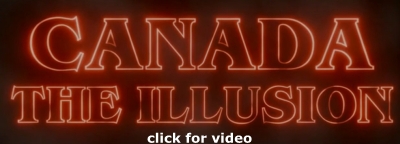

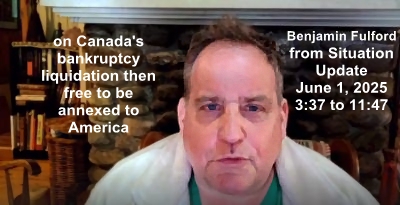

 Very
good people are in Canada, but corrupt ones at the top in most every area,
Very
good people are in Canada, but corrupt ones at the top in most every area, such as its banks and
its media et al,
including politicians, health
depts., judges, lawyers, courts, the so-called
'justice' system.(where
the
so-called 'laws' made by 'just us', not you),
corporations local, regional, municipal & provincial, hiding their
evil doings from the public, but soon the good broadminded
ones will also know. The corrupt ones are all part of a corrrupt game,
a game based on so many lies. See
at 50:47 to 52:14.
such as its banks and
its media et al,
including politicians, health
depts., judges, lawyers, courts, the so-called
'justice' system.(where
the
so-called 'laws' made by 'just us', not you),
corporations local, regional, municipal & provincial, hiding their
evil doings from the public, but soon the good broadminded
ones will also know. The corrupt ones are all part of a corrrupt game,
a game based on so many lies. See
at 50:47 to 52:14.

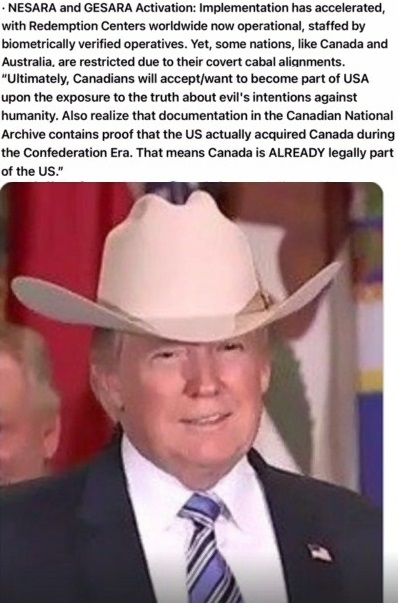
 ***
***